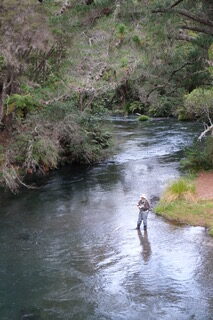Increase in illegal dredging, gravel work and bank modification works in Wales triggers notices

Anglers be aware: in appropriate bank-work can affect a river for many miles downstream.
Following a noticeable increase in “dredging, removing shoals, realignment of water courses and inappropriate bank protection” Natural Resources Wales (NRW) has set up a task force to tackle the problem. Following a spate of physical modifications to rivers and streams, which cause long-term damage, potentially lasting many decades with harm to habitats and species often extending miles downstream from where the modification work occurred, more than 30 legal notices to stop and remediate have been served on landowners.
Oliver Lowe, Geomorphology Specialist Advisor for NRW said: “During lockdown, Wales experienced an unprecedented increase in unconsented physical modifications to its watercourses, including dredging, removing shoals, realignment of water courses and inappropriate bank protection”.
The illegal dredging, realigning and gravel removal on watercourses has a negative impact on the animals, fish and plants in rivers and streams.
Oliver Lowe gave an example of works carried out in 2021 which comprised the installation of a gabion basket wall. This resulted in the narrowing of the river channel, increased water velocity, erosion, flood risk and destruction of river habitats. Officers visited the site, issued a notice for the work to stop, and then restore the river back to its former state. “Today, the landowner has restored the bank profile, reseeded the ground with native wetland grasses and wildflowers and willow and alder trees are being planted on the bank to improve stability. Once the plants have established, this site will resemble a natural riverbank bursting with native species and supporting the riverine environment” sad Mr Lowe.
“We set up a Physical Harm to Rivers task force to improve our response to such incidents and we have delivered more than 30 regulatory notices on unconsented work.
“Our improved response is changing landowner behaviours as word of our action spreads. We also have the option of pursuing prosecution if the incident is particularly severe. Should a notice not be complied with then this can result in a fine and criminal prosecution”, warned Mr Lowe.
Hilary Foster, Specialist Advisor for Freshwater Habitats and Species for NRW said: “This work is part of our Wales-wide River Restoration Programme which also includes the delivery of ambitious river restoration projects.
“Our improved response to these incidents is successfully protecting our rivers from harm and supporting our goal of ecosystem resilience. This work has generated interest from the regulatory authorities in England, Scotland and as far afield in Norway.
She reiterated that anyone considering undertaking any work on a watercourse should contact NRW, who will provides advice, information on any necessary permissions, and measures to avoid environmental harm.
Anyone not consulting NRW prior to undertaking works on a river or stream is at risk of committing an offence, and enforcement measures may include the requirement to restore the damaged habitat.
If anyone sees or suspects that someone is working in a Welsh river illegally, call NRW’s incident hotline on 0300 065 3000.



